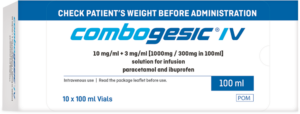Combogesic® IV’s patented 3.3 to 1 paracetamol to ibuprofen ratio has been proven to provide significantly better pain relief than the same dose of either paracetamol IV or ibuprofen IV alone.
Combogesic® IV was developed to provide a combination analgesic therapy with the administration of a single formulation in perioperative patients unable to receive oral analgesics.
Warnings
Always read the label. See the package leaflet or product information for the full list of warnings and precautions
You should not be given Combogesic IV:
• if you are allergic to the active substances, other NSAIDs, or any of the other ingredients of this medicine;
• if you have severe heart failure, liver failure or kidney failure;
• if you regularly drink large quantities of alcohol;
• if you have asthma, urticaria or allergic-type reactions after taking acetylsalicylic acid or other NSAIDs;
• if you have a history with gastrointestinal bleeding or perforation related to previous NSAID therapy;
• if you have an active or recurrent peptic ulcer (i.e. stomach or duodenal ulcer), or bleeding (two or more distinct episodes of proven ulceration or bleeding);
• if you have bleeding of the brain (cerebrovascular bleeding) or other active bleeding;
• if you have a blood clotting disorder or increased tendency to bleeding;
• if you have severe dehydration (caused by vomiting, diarrhoea or insufficient fluid intake);
• during the last three months of pregnancy;
• if you are under the age of 18 years.
Warnings and precautions
• Do not take other medicines containing paracetamol while using this medicine.
• Avoid overdose: check other medicines for paracetamol and do not exceed the maximum recommended dose.
• Prolonged or high-dose use may cause serious harm to the stomach and kidneys, and may affect blood potassium levels, which can be fatal.
• Use the lowest effective dose for the shortest time. Do not use for more than 2 days.
• Speak to your doctor or nurse before use if you:
– Take other paracetamol, ibuprofen, or NSAID medicines.
– Have heart, liver, kidney, bowel, stomach, or respiratory conditions.
– Have severe renal impairment or sepsis, malnutrition, dehydration, chronic alcoholism or if you are also taking flucloxacillin
– Currently have or have a history of ulcers, high blood pressure, diabetes, stroke, heartburn, or infections.
– Have an inherited genetic or acquired disorder of certain enzymes that manifests with either neurological complications or skin problems or occasionally both, i.e. porphyria, or an autoimmune disease such as Lupus erythematosus or other connective tissue disorders, as there may be an increased risk of aseptic meningitis
– Have hay fever, nasal polyps or chronic obstructive respiratory disorders
– Are pregnant or planning pregnancy.
• NSAIDs may slightly increase the risk of heart attack or stroke. Do not exceed the recommended dose or duration.
• Serious gastrointestinal and skin reactions can occur, sometimes without warning. Older people have a higher risk.
• Combogesic IV may mask infection symptoms, delaying treatment. Seek medical advice if symptoms persist or worsen.
• Long-term painkiller use may cause headaches. Do not treat with more painkillers—speak to your doctor.
• Stop use and see a doctor if you experience vision problems.





